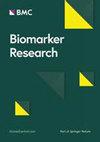Global research hotspots, development trends and prospect discoveries of phase separation in cancer: a decade-long informatics investigation
IF 9.5
2区 医学
Q1 MEDICINE, RESEARCH & EXPERIMENTAL
引用次数: 0
Abstract
Liquid-liquid phase separation (LLPS) is a complex and subtle phenomenon whose formation and regulation take essential roles in cancer initiation, growth, progression, invasion, and metastasis. This domain holds a wealth of underutilized unstructured data that needs further excavation for potentially valuable information. Therefore, we retrospectively analyzed the global scientific knowledge in the field over the last decade by using informatics methods (such as hierarchical clustering, regression statistics, hotspot burst, and Walktrap algorithm analysis). Over the past decade, this area enjoyed a favorable development trend (Annual Growth Rate: 34.98%) and global collaboration (International Co-authorship: 27.31%). Through unsupervised hierarchical clustering based on machine learning, the global research hotspots were divided into five dominant research clusters: Cluster 1 (Effects and Mechanisms of Phase Separation in Drug Delivery), Cluster 2 (Phase Separation in Gene Expression Regulation), Cluster 3 (Phase Separation in RNA-Protein Interaction), Cluster 4 (Reference Value of Phase Separation in Neurodegenerative Diseases for Cancer Research), and Cluster 5 (Roles and Mechanisms of Phase Separation). And further time-series analysis revealed that Cluster 5 is the emerging research cluster. In addition, results from the regression curve and hotspot burst analysis point in unison to super-enhancer (a=0.5515, R2=0.6586, p=0.0044) and stress granule (a=0.8000, R2=0.6000, p=0.0085) as the most potential star molecule in this field. More interestingly, the Random-Walk-Strategy-based Walktrap algorithm further revealed that “phase separation, cancer, transcription, super-enhancer, epigenetics”(Relevance Percentage[RP]=100%, Development Percentage[DP]=29.2%), “stress granule, immunotherapy, tumor microenvironment, RNA binding protein”(RP=79.2%, DP=33.3%) and “nanoparticle, apoptosis”(RP=70.8%, DP=25.0%) are closely associated with this field, but are still under-developed and worthy of further exploration. In conclusion, this study profiled the global scientific landscape, discovered a crucial emerging research cluster, identified several pivotal research molecules, and predicted several crucial but still under-developed directions that deserve further research, providing an important reference value for subsequent basic and clinical research of phase separation in cancer.癌症相分离的全球研究热点、发展趋势和前景发现:长达十年的信息学调查
液-液相分离(LLPS)是一种复杂而微妙的现象,其形成和调节在癌症的发生、生长、进展、侵袭和转移过程中起着至关重要的作用。这一领域蕴藏着大量未充分利用的非结构化数据,需要进一步挖掘潜在的有价值信息。因此,我们采用信息学方法(如分层聚类、回归统计、热点突变和Walktrap算法分析)对过去十年该领域的全球科学知识进行了回顾性分析。过去十年间,该领域呈现出良好的发展态势(年增长率:34.98%)和全球合作(国际合著率:27.31%)。通过基于机器学习的无监督分层聚类,全球研究热点被划分为五个主要研究集群:聚类 1(相分离在药物传输中的作用和机制)、聚类 2(相分离在基因表达调控中的应用)、聚类 3(相分离在 RNA 蛋白相互作用中的应用)、聚类 4(相分离在神经退行性疾病中对癌症研究的参考价值)和聚类 5(相分离的作用和机制)。进一步的时间序列分析表明,群组 5 是新兴的研究群组。此外,回归曲线和热点爆发分析的结果一致指出,超级增强子(a=0.5515,R2=0.6586,p=0.0044)和应激颗粒(a=0.8000,R2=0.6000,p=0.0085)是该领域最具潜力的明星分子。更有趣的是,基于随机漫步策略的漫步陷阱算法进一步发现,"相分离、癌症、转录、超级增强子、表观遗传学"(相关性百分比[RP]=100%,发展百分比[DP]=29.2%)、"应激颗粒、免疫疗法、肿瘤微环境、RNA 结合蛋白"(RP=79.2%,DP=33.3%)和 "纳米粒子、细胞凋亡"(RP=70.8%,DP=25.0%)与本领域密切相关,但仍未得到充分开发,值得进一步探讨。总之,本研究剖析了全球科学格局,发现了一个重要的新兴研究集群,确定了几个关键的研究分子,预测了几个关键但仍未得到充分发展、值得进一步研究的方向,为后续癌症相分离的基础和临床研究提供了重要的参考价值。
本文章由计算机程序翻译,如有差异,请以英文原文为准。
求助全文
约1分钟内获得全文
求助全文
来源期刊

Biomarker Research
Biochemistry, Genetics and Molecular Biology-Molecular Medicine
CiteScore
15.80
自引率
1.80%
发文量
80
审稿时长
10 weeks
期刊介绍:
Biomarker Research, an open-access, peer-reviewed journal, covers all aspects of biomarker investigation. It seeks to publish original discoveries, novel concepts, commentaries, and reviews across various biomedical disciplines. The field of biomarker research has progressed significantly with the rise of personalized medicine and individual health. Biomarkers play a crucial role in drug discovery and development, as well as in disease diagnosis, treatment, prognosis, and prevention, particularly in the genome era.
 求助内容:
求助内容: 应助结果提醒方式:
应助结果提醒方式:


